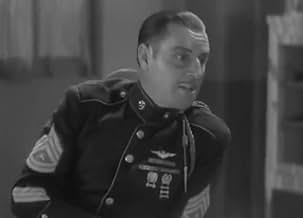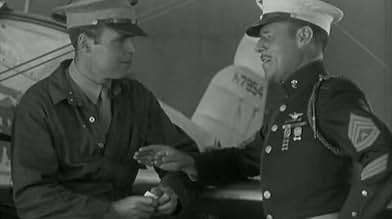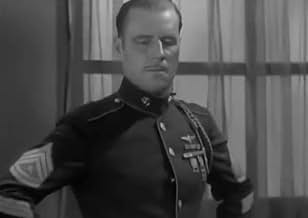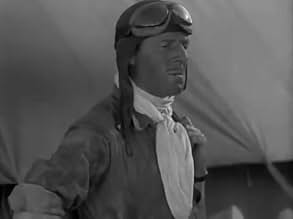अपनी भाषा में प्लॉट जोड़ेंA Marine flyer and his flight school mentor fall for the same beautiful nurse.A Marine flyer and his flight school mentor fall for the same beautiful nurse.A Marine flyer and his flight school mentor fall for the same beautiful nurse.
Harold Goodwin
- Steve Roberts
- (as Harald Goodwin)
Joe Bordeaux
- Marine
- (बिना क्रेडिट के)
Walter Brennan
- Marine Pilot
- (बिना क्रेडिट के)
Eddy Chandler
- Marine Sergeant - Panama's Buddy
- (बिना क्रेडिट के)
Edgar Dearing
- Football Coach
- (बिना क्रेडिट के)
George Irving
- Marine Colonel in Nicaragua
- (बिना क्रेडिट के)
फ़ीचर्ड समीक्षाएं
Frank Capra's first full sound film doesn't have sound anymore, so looking at his second sound film, Flight, shows a technician doing everything he can to take advantage of the new sound while filming a lot outside, challenging himself by pushing against the limits of the contemporaneous technology, and yet it's all in service to a story so thin spread out over one hundred and ten minutes that nothing really connects. If this had come in at a more reasonable 80 minutes instead of 110, I think it could have worked a lot better, however at its extended runtime, it's just much more boring than it should have been.
Lefty Phelps (Ralph Graves) has to live down an embarrassing moment in his college football career when he got mixed up and ran the ball the wrong way down the field to lose the game, an event witnessed by Marine Corps pilot Panama Williams (Jack Holt) who encourages him to join the Marines to gain some purpose in life. The whole subplot of Lefty living down the reputation is kind of odd, especially since news of it only spreads amongst the recruits because he keeps a clipping of the event on him at all times, a clipping that falls out of his pocket and gets picked up by someone who makes fun of him because of the reminder. It's also supposed to feed into this idea at the core of Lefty as a character that he's afraid of trying again, limited by a fear that makes him screw up in similar ways, like when he can't get his aircraft to lift off the ground at his graduation test.
The actual dramatic meat of the film ends up being a little love triangle between Lefty, Panama, and the nurse Elinor (Lila Lee). Panama is really consumed with her though she is only really polite in return. She becomes enamored of the young, more handsome Lefty, but Lefty is too loyal to Panama for helping him out of his funk and bringing him along on the later stage mission to Nicaragua as his mechanic to go selfish regarding his own desires towards Elinor.
And that's kind of it. It's a very simple love triangle that takes a while to develop over the film, doesn't have a whole lot of dimension to it, but is earnestly told with a couple of nice little mechanical twists to it (like Panama getting Lefty as his mechanic). For a short melodrama it might have been enough, but this is a nearly two hour film.
The final bit is dominated by this sudden, underdeveloped need for the Marines to use airplanes against bandits in Nicaragua against a bandit named Lobo (Jimmy De La Cruze). It's handled with some quick dialogue that he's attacked some Americans there, the actual battle is a technically competent execution of capturing action in flight while the actual stakes are thin and hardly ever explained in anything other than the broadest of detail. There's a bit where Lefty ends up behind enemy lines that very closely mirrors the similar third act mechanics of Submarine with the slight benefit of Panama sacrificing one other soldier other than Lefty than a submarine full of them, combined with the fact that we know that Lefty is the only one left alive from the crash (something Panama doesn't know). The pique is, of course, sourced from the love triangle dynamics, and it sort of works in this melodramatic context, but only sort of.
The sound design, since its so early in the sound era and fascinates me, is this curious mixture of experiments, some that work others that don't, of trying to make a soundscape pleasing to the audience. On the one hand, the opening football game has a surprising uniformity to the background, possibly executed by capturing a similar roar of cheers across all of the shots (it really does feel like this is still the moment when sound mixing hadn't been applied to film soundtracks yet). There is also this tendency to drop out all sound in between lines of dialogue on scenes filmed outside, so we get the ambiance of the field when someone says something, all sound drops out for a second, and then someone else speaks and that ambiance comes back. It's kind of weird, but Capra and his sound team was trying to make this whole sound thing work, at least.
So, I'd probably say that Submarine is the better of the two Howard Hawks-like films that Capra had made up to this point. Hawks made them better because he had a stronger sense of these types of characters and had a more interesting way to portray these women as strong and belonging in the world instead of waifishly sitting around while things happen around her. For a better look at airmen of the time, I'd recommend Hawks' version of The Dawn Patrol, but he was juggling these kinds of love triangles even in stuff like Tiger Shark.
Anyway, it was okay. Its story is fine, just not very meaty, and the spectacle is pretty good, if unsupported by much narrative. It's a middling little adventure and melodrama that has understandably been largely forgotten by everyone save Capra completists.
Lefty Phelps (Ralph Graves) has to live down an embarrassing moment in his college football career when he got mixed up and ran the ball the wrong way down the field to lose the game, an event witnessed by Marine Corps pilot Panama Williams (Jack Holt) who encourages him to join the Marines to gain some purpose in life. The whole subplot of Lefty living down the reputation is kind of odd, especially since news of it only spreads amongst the recruits because he keeps a clipping of the event on him at all times, a clipping that falls out of his pocket and gets picked up by someone who makes fun of him because of the reminder. It's also supposed to feed into this idea at the core of Lefty as a character that he's afraid of trying again, limited by a fear that makes him screw up in similar ways, like when he can't get his aircraft to lift off the ground at his graduation test.
The actual dramatic meat of the film ends up being a little love triangle between Lefty, Panama, and the nurse Elinor (Lila Lee). Panama is really consumed with her though she is only really polite in return. She becomes enamored of the young, more handsome Lefty, but Lefty is too loyal to Panama for helping him out of his funk and bringing him along on the later stage mission to Nicaragua as his mechanic to go selfish regarding his own desires towards Elinor.
And that's kind of it. It's a very simple love triangle that takes a while to develop over the film, doesn't have a whole lot of dimension to it, but is earnestly told with a couple of nice little mechanical twists to it (like Panama getting Lefty as his mechanic). For a short melodrama it might have been enough, but this is a nearly two hour film.
The final bit is dominated by this sudden, underdeveloped need for the Marines to use airplanes against bandits in Nicaragua against a bandit named Lobo (Jimmy De La Cruze). It's handled with some quick dialogue that he's attacked some Americans there, the actual battle is a technically competent execution of capturing action in flight while the actual stakes are thin and hardly ever explained in anything other than the broadest of detail. There's a bit where Lefty ends up behind enemy lines that very closely mirrors the similar third act mechanics of Submarine with the slight benefit of Panama sacrificing one other soldier other than Lefty than a submarine full of them, combined with the fact that we know that Lefty is the only one left alive from the crash (something Panama doesn't know). The pique is, of course, sourced from the love triangle dynamics, and it sort of works in this melodramatic context, but only sort of.
The sound design, since its so early in the sound era and fascinates me, is this curious mixture of experiments, some that work others that don't, of trying to make a soundscape pleasing to the audience. On the one hand, the opening football game has a surprising uniformity to the background, possibly executed by capturing a similar roar of cheers across all of the shots (it really does feel like this is still the moment when sound mixing hadn't been applied to film soundtracks yet). There is also this tendency to drop out all sound in between lines of dialogue on scenes filmed outside, so we get the ambiance of the field when someone says something, all sound drops out for a second, and then someone else speaks and that ambiance comes back. It's kind of weird, but Capra and his sound team was trying to make this whole sound thing work, at least.
So, I'd probably say that Submarine is the better of the two Howard Hawks-like films that Capra had made up to this point. Hawks made them better because he had a stronger sense of these types of characters and had a more interesting way to portray these women as strong and belonging in the world instead of waifishly sitting around while things happen around her. For a better look at airmen of the time, I'd recommend Hawks' version of The Dawn Patrol, but he was juggling these kinds of love triangles even in stuff like Tiger Shark.
Anyway, it was okay. Its story is fine, just not very meaty, and the spectacle is pretty good, if unsupported by much narrative. It's a middling little adventure and melodrama that has understandably been largely forgotten by everyone save Capra completists.
The film is about two pilots--one who is the veteran flight instructor at Pensacola Naval Air Station (Tim Holt) and the other is a man who desperately wants to earn his wings, but he's terribly unsure of himself (Ralph Graves). Over time, a friendship develops between them that is challenged when both men fall for the same Navy nurse.
While all this might seem a bit predictable and clichéd, for 1929 it was pretty good stuff. Plus, all the familiar story elements contained in the film were NOT clichés, as this film introduced many of these items that would later become standard plot lines. Plus, the film is aided by excellent flying scenes and some amazingly fun and witty dialog every now and again. Graves made several comments that had me laughing. Because of this and the easy-going banter between them, this was a very likable film--particularly for nuts like me that adore early aviation films. The film abounds with great footage of aircraft and is a must-see for aviation fans.
By the way, the team of Graves and Holt made quite a few early military-inspired films for Columbia--making them the first stars for this fledgling studio. In addition to Marine pilots like they were in this film, they also starred in other films about US military (such as DIRIGIBLE, A DANGEROUS AFFAIR, FLYING FLEET and SUBMARINE). Oddly, despite their success, by 1931-1932, their careers as leading men were pretty much over.
One negative about the film is the sound quality. Though it does improve later in the film, FLIGHT is terribly in need of restoration as some of the dialog is very, very difficult to understand--a rather common problem with films from the early sound era. Closed captioning would have been nice, but was not included.
While all this might seem a bit predictable and clichéd, for 1929 it was pretty good stuff. Plus, all the familiar story elements contained in the film were NOT clichés, as this film introduced many of these items that would later become standard plot lines. Plus, the film is aided by excellent flying scenes and some amazingly fun and witty dialog every now and again. Graves made several comments that had me laughing. Because of this and the easy-going banter between them, this was a very likable film--particularly for nuts like me that adore early aviation films. The film abounds with great footage of aircraft and is a must-see for aviation fans.
By the way, the team of Graves and Holt made quite a few early military-inspired films for Columbia--making them the first stars for this fledgling studio. In addition to Marine pilots like they were in this film, they also starred in other films about US military (such as DIRIGIBLE, A DANGEROUS AFFAIR, FLYING FLEET and SUBMARINE). Oddly, despite their success, by 1931-1932, their careers as leading men were pretty much over.
One negative about the film is the sound quality. Though it does improve later in the film, FLIGHT is terribly in need of restoration as some of the dialog is very, very difficult to understand--a rather common problem with films from the early sound era. Closed captioning would have been nice, but was not included.
The plot is certainly familiar from many other movies, notably "Tell it to the Marines". The old timer versus the cheeky new recruit. And of course the girl that the sergeant wants is actually in love with the recruit, who feels rotten about it because the sergeant has been so nice to him. But the characters are interesting, particularly Jack Holt's,the camaraderie is nice to watch and there is plenty of action, flying scenes and battle scenes,fascinating shots of old time airplanes, all of which make this a fun movie to watch, which after all is the important thing in a movie of this type.Very pleasant entertainment in spite of the sound problems.
Flight (1929)
** (out of 4)
Frank Capra directed this early talkie about two buddies (Jack Holt, Ralph Graves) in the Navy Air Corps who fall in love with the same woman (Lila Lee). This film runs nearly two hours and one of those hours are brilliant but it's spread across the entire running time. The flight and war sequences are simply brilliant with a lot of realistic action and some breathtaking footage of the planes in the air. Had Capra only shown that stuff then this could have been another masterpiece from the director but sadly we get a stupid love story to drag everything down. Jack Holt is brilliant in his role adding a lot of humor to the part but Graves, who co-wrote the story, doesn't fair as well. Lila Lee is cute in her part but she's certainly not the greatest actress out there.
** (out of 4)
Frank Capra directed this early talkie about two buddies (Jack Holt, Ralph Graves) in the Navy Air Corps who fall in love with the same woman (Lila Lee). This film runs nearly two hours and one of those hours are brilliant but it's spread across the entire running time. The flight and war sequences are simply brilliant with a lot of realistic action and some breathtaking footage of the planes in the air. Had Capra only shown that stuff then this could have been another masterpiece from the director but sadly we get a stupid love story to drag everything down. Jack Holt is brilliant in his role adding a lot of humor to the part but Graves, who co-wrote the story, doesn't fair as well. Lila Lee is cute in her part but she's certainly not the greatest actress out there.
Frank Capra made three films with the same two actors, Jack Holt and Ralph Graves, probably in an effort to establish the male buddy film. It would take James Cagney and Pat O'Brien to get that genre off the ground. Flight is the second of those three Graves/Holt films and the first one in sound.
It also has the same kind of roughhouse humor that would characterize the work of John Ford. In fact if you didn't know this was an early Capra film, you'd swear Ford did it.
Flight is certainly a film from the headlines of the day. It begins with college football hero Ralph Graves making a spectacular run in the Rose Bowl, the wrong way. Capra made no secret of it, he was at the Rose Bowl that year with Harry Cohn and saw Roy Rieggles playing for USC get turned around in eluding tacklers and made a spectacular run the wrong way and scored the margin of victory for Georgia Tech. The poor man never lived it down.
In fact Graves decides the Marine Corps is the place for blessed anonymity and he gets involved with aviation under the tutelage of Jack Holt. But the two of them have a falling out over nurse Lila Lees. Later on they see action in Nicaragua where the USA was maintaining a presence in hunting down those original Sandinistas.
The Marine aviators rescue a company of Marines in a Dienbienphu like situation with the Sandinistas. The battle scenes were very well staged.
Flight is not a typical Frank Capra film because Frank Capra had not found his style and type of story. Still it's a well made action film for the time.
It also has the same kind of roughhouse humor that would characterize the work of John Ford. In fact if you didn't know this was an early Capra film, you'd swear Ford did it.
Flight is certainly a film from the headlines of the day. It begins with college football hero Ralph Graves making a spectacular run in the Rose Bowl, the wrong way. Capra made no secret of it, he was at the Rose Bowl that year with Harry Cohn and saw Roy Rieggles playing for USC get turned around in eluding tacklers and made a spectacular run the wrong way and scored the margin of victory for Georgia Tech. The poor man never lived it down.
In fact Graves decides the Marine Corps is the place for blessed anonymity and he gets involved with aviation under the tutelage of Jack Holt. But the two of them have a falling out over nurse Lila Lees. Later on they see action in Nicaragua where the USA was maintaining a presence in hunting down those original Sandinistas.
The Marine aviators rescue a company of Marines in a Dienbienphu like situation with the Sandinistas. The battle scenes were very well staged.
Flight is not a typical Frank Capra film because Frank Capra had not found his style and type of story. Still it's a well made action film for the time.
क्या आपको पता है
- ट्रिवियाThe wrong-way run was based on the infamous play by Roy Riegels of the University of California in the 1929 Rose Bowl. With the score 0-0 in the second quarter, Riegels recovered a Georgia Tech fumble at the Yellow Jackets' 30, but he somehow got turned the wrong way and ran 65 yards toward his own goal line. A teammate grabbed him, but he was dropped at his own 1. The Golden Bears elected to punt, the punt was blocked out of the end zone for a safety touch and the two points provided the margin of victory in Georgia Tech's 8-7 win. The movie uses actual footage of Riegels from the game.
- गूफ़When Lefty Phelps is polishing an aircraft, Sergeant Williams calls to him by yelling "Hey, soldier!" As both men are US Marines, the sergeant would not have addressed him that way. Soldiers are members of the US Army and a Marine would actually consider that remark to be an insult.
- भाव
Steve Roberts: [On the Nicaraguan rebels] You know damn well what's going to happen if these people come along and catch you alive.
- कनेक्शनFeatured in Frank Capra, il était une fois l'Amérique (2020)
- साउंडट्रैकMy Mammy
(1921) (uncredited)
Music by Walter Donaldson
Lyrics by Sam Lewis and Joe Young
Sung a bit a cappella by Ralph Graves
टॉप पसंद
रेटिंग देने के लिए साइन-इन करें और वैयक्तिकृत सुझावों के लिए वॉचलिस्ट करें
विवरण
- रिलीज़ की तारीख़
- कंट्री ऑफ़ ओरिजिन
- भाषा
- इस रूप में भी जाना जाता है
- Kartalların Avdeti
- फ़िल्माने की जगहें
- उत्पादन कंपनी
- IMDbPro पर और कंपनी क्रेडिट देखें
- चलने की अवधि1 घंटा 50 मिनट
- रंग
इस पेज में योगदान दें
किसी बदलाव का सुझाव दें या अनुपलब्ध कॉन्टेंट जोड़ें





























